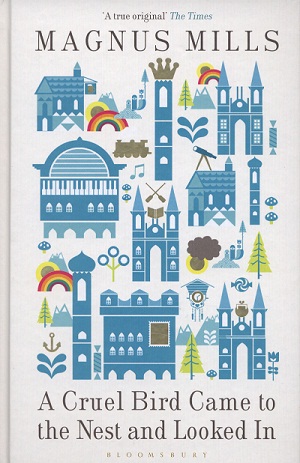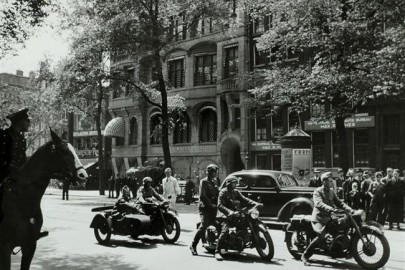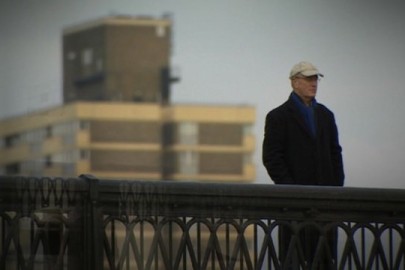Elberry enjoys a new addition to the pantheon of great surrealists…
In an age of drably realistic novels about middle class London fools and their tedious midlife crises, it’s refreshing to read a book narrated by the Principal Composer to the Imperial Court of Greater Fallowfields.
Alas for Greater Fallowfields, the Emperor has disappeared. A newly-selected Cabinet try to make sense of their largely meaningless posts. The narrator knows nothing about music and finds his orchestra (of serfs) are in fact ably managed by a violinist of genius called Greylag. The musicians live in the music hall:
I walked up and found a large proportion of the orchestra sitting in three rows of hard seats.
‘What are you doing here?’ I asked.
‘Waiting to go to sleep, sir,’ said Greylag.
‘What do you mean “waiting”?’
‘Well, sir,’ he said, ‘we’ve only got one bed between us, so we all have to take our turns.’
‘Show me,’ I ordered.
Greylag led me beyond the orchestra pit to an antechamber. Inside was a broad wooden cot in which a dozen cellos lay side by side, all fast asleep.
‘The bassoons have their turn next, sir,’ explained Greylag, ‘followed by the trumpets and trombones.’
‘And meanwhile you all sit waiting in the hard seats?’
‘Yes, sir.’
‘Then why don’t you use the soft seats at the front?’ I enquired. ‘Surely, they’d be much more comfortable.’
‘It’s not allowed,’ said Greylag.
‘Whyever not?’
‘I’m not sure, sir.’
This is fairly typical of Greater Fallowfields, though one should not imagine it as a tyranny. Society is arranged for nobody’s benefit. Thus the Cabinet are paid sixpence but can’t buy anything because the local tradesmen only sell things to commoners. The sixpences are in fact useless for anything except operating the imperial telescope. The Empire, which resembles a large village, is a half-functioning shambles of pointless regulations and unexamined customs. There is no real locus of authority, no central organisation. Things just happen because this is the custom, and it suits people. Thus the Postmaster General on the exceptionally slow postal system:
Hitherto, such delays have been viewed as intrinsic to the postal system, the general assumption being that they are largely unavoidable.’ Garganey paused momentarily before continuing. ‘My recent studies, however, have shown that this is not quite the case. There is, in fact, a simple explanation: namely, the postmen’s custom of stopping halfway through the morning and coming back for breakfast.’
The problem proves insurmountable. This chaos is general. People work and live amidst a mess of contradictory, bizarre laws and regulations, and for the most part they seem content. Only the Cabinet, who naturally enough expect there to be some order, are struck by the apparent nonsense of daily life. The more they attempt to extract or impose order, the weirder things become. Thus Smew, the Librarian-in-Chief, forges Imperial orders, one being that “the sun will set daily at 5 o’clock”. His deceit is then discovered. In another novel this would lead to a murder or two but Greater Fallowfields is much more sensibly English:
‘There was no edict, was there?’ I said.
‘No,’ Smew answered.
‘It was all concocted for your personal enjoyment.’
‘Yes.’
‘What about the emperor?’
‘He’s not here.’
‘Only this pretend crown?’
‘Correct.’
Wryneck and Smew had begun to look very uncomfortable. I glanced around at the cups and saucers, the teapot, the plates and the toasted soldiers. I watched the last rays of sunset creep slowly across the room. Finally I passed judgement.
‘Rather selfish, wasn’t it?’
There is no question of an uprising, of murders or executions or pitched street battles. This is an empire where things are decided, or rather talked about, over toasted soldiers and tea. All authority has long since departed and nobody knows why things are the way they are. It seems impossible to really effect any changes; the Cabinet rather just observe things mouldering on. And it seems this predates the emperor’s departure; Smew remarks that he “only discovered the emperor was absent when he neglected to return his library books.” They are left with a fake crown and a Cabinet of largely ignorant duffers. It even transpires that the emperor is technically not even an emperor, as he failed to return for his coronation. Smew forges imperial edicts then arranges for himself to be made regent. But it makes little difference to the mouldering disorder of things.
In real life, such an empire – without an army, police, money – would be quickly gobbled up by the nearest neighbour. And so here, there is an inexplicable railroad advancing day by day from the east. This is very different – ferociously well-organised, run by humourless men in uniform, all apparently working for the neighbouring City of Scoffers. They send scouts to walk about the empire doing what look like Health and Safety assessments; and conscripting the Fallowfielders into the City of Scoffers’ workforce, as the Postmaster reports:
What they do is they slip unsuspecting persons a sixpence on some pretext, for example, in return for a small favour. Once the coin has been accepted it’s deemed a ‘consideration’. Thereafter the contract is binding. That’s how they snared most of my postmen.
The railroad arrives and the bureaucrats present a bill to the Imperial Cabinet, for the construction of the railroad no one requested.
‘I suppose we have no alternative but to pay,’ said Smew. ‘After all, they’ve fulfilled their part of the bargain.’ He turned to Brambling. ‘Do we have enough money in the imperial purse?’
‘Almost,’ Brambling replied. ‘We’re just half-a-crown short.’
[…]
‘Surely, though,’ said Garganey, ‘if we’re down to our last half-crown we’re in dire straits indeed.’
‘Not necessarily,’ said Smew. ‘You really should have more faith in the empire. Our people are our greatest resource, and I have no doubt that together we will all pull through.’
These are precisely the kind of words I wanted to hear. Indeed, I was most impressed by Smew’s bearing during this episode. He seemed to possess all the prerequisites of a true ruler of men: sound judgement, patience, and calmness. Smew was unflappable, which meant that we had nothing to worry about.
At this point one might suspect Smew of having done in the emperor and made a deal with the City of Scoffers – high position in return for selling his country. While Greater Fallowfields is disorganised and inefficient, it seems far more amiable than the City of Scoffers (whose symbol is a hammer and anvil). The Fallowfielders seem quite cheerful and to have largely made a very English compromise between their volition and the will of some long-vanished government; it is, if you like, Tory Anarchsim. The City of Scoffers is, by contrast, a highly-regulated place:
The entire place ticked along like clockwork, and anything which jeopardised its smooth operation was dealt with immediately. Rules and regulations were applied to the letter; correct procedures were invariably followed; and, of course, the trains always ran on time. As a matter of fact, from what I could gather it was the railways which were the governing force here. Virtually every aspect of daily life was imbued with their influence: the dictatorship of the clocks was endemic and unavoidable. Standard Railyway Time applied throughout the year; the length of a day had nothing to do with natural occurrences such as sunrise and sunset.
Outside the headquarters of the Scoffers railroad, a sign: “THERE IS NO ALTERNATIVE TO TRAINS.” The narrator notes to himself:
Needless to say, there was an alternative to trains – namely, shipping – but as we were so far from the sea I allowed them this oversight.
Greater Fallowfields originally derived its wealth from shipping; its great maritime power has not merely declined but completely disappeared, and with it all revenues, might, purpose. The City of Scoffers seems, by contrast, impressively determined.
This is an easy book to read but difficult to make sense of; in this, it is reminiscent of the great surrealists: Kafka, Mervyn Peake, Frank Key, Wes Anderson. For myself, Greater Fallowfields is a kind of England, or Englishness – the empire in decay with bumbling but occasionally brilliant amateurship, inefficient and odd and highly improbable. In a darker light, one could see it as akin to Eliot’s “heap of broken images”, an empire with useless sixpences, a fake crown, and no emperor. This is a world in which symbols and images have no living power, because no one understands them, no one has a feeling for their origin and purpose. And yet, in true English style it is all an amiable muddle.
All this seems preferable to the City of Scoffers, a different empire with ferocious, mindless purpose. As allegory, I wavered between identifying the City as the EU or capitalism; then I decided it’s just the urge to control, to quantify, to organise, to mechanise – trains rather than ships, a more absolute, pressing domination. A cruel bird indeed.
In Mills’ book both Greater Fallowfields and the City of Scoffers are elaborations of human thought (our imagination throws up forms we cannot understand but must inhabit). The City seems the more rational and sensible, in that everything is efficient and makes a kind of sense if you think like a vile economist. In Greater Fallowfields nothing makes any sense but, if you look closer, it seems that the imaginative investment is equal in both lands – that in both cases the citizens give credence to customs without much thought. Civilisations are, at root, works of the imagination: whether it is some folkish custom about sixpence or the Health & Safety culture, it is produced by the human mind. In this novel, transport is the central expression of the imaginative impulse; so at the end, yet another nation arrives in Greater Fallowfields:
These people aren’t a bit like us but they insist that they’re our closest cousins. I’ve met them and they appear to be very earnest, though I must say they take some getting used to. They speak in superlatives, they walk with a swagger and they constantly refer to themselves as ‘liberators’ […] they want to establish an automotive industry in Fallowfields.
Long-defunct shipping in Fallowfields, trains in the City of Scoffers, and cars for the swaggering liberators. In our world, it would be the internet. For Mills, transport – bustle, fuss, speed, movement – is the central symbol of the communal imagination. In a larger sense, transport is how we connect to each other, how we leave our homes, our selves, and meet others. In our world, it would be the internet. There are advertisements boasting vast bandwidth and one may ask, what for?
But then this is human civilisation – it is defined by its wasteful expenditure, and by its mode of human connection (Facebook, Skype, etc.). But Mills is an odd bod. All his civilisations are absurd, whether the amiable Fallowfielders, the Stalinist City of Scoffers, or the swaggering liberators. Mills has a different perspective; he looks on the modern world with wonder and bemusement; as would, I imagine, a citizen of ancient Uruk.
From a sufficiently distant (alien or ancient) perspective, the modern world is innately bizarre. The economy is largely dependent on non-essential luxuries. In Mills’ world, it’s all lunatic: Greater Fallowfields, the City of Scoffers, the swaggering liberators, nothing really makes sense. His perspective is so distant he could be non-human. And it is true, though we would largely resent such judgement. One may, then, make a choice: in which absurdity does one feel at home? Some are easier to live in, seem closer to the natural shape of humanity, in all its disorder and flexibility and bodge. It can be liberating, to see all civilisations as fairly lunatic products of the imagination; for then one can judge between absurdity and absurdity, one can say, I choose this; this is my land, my Eþel, my Heimat; here, I am at home.











wow that seems to be very different from the other book of his I’ve read ‘The Restraint of Beasts’ which was quite simple in scope and ambition.
Smew, excellent name. Is there another Smew in literature? seems familiar (apart from being a bird)
It is an ambitious book and the more pleasing as it is short and apparently light. We tend to associate ambition with 9000-page epics but one could just as well write a history of short, ambitious books.